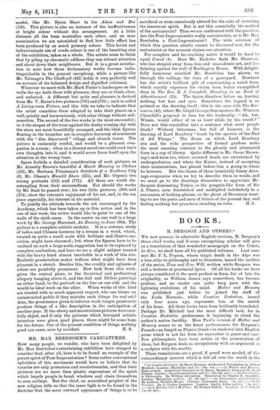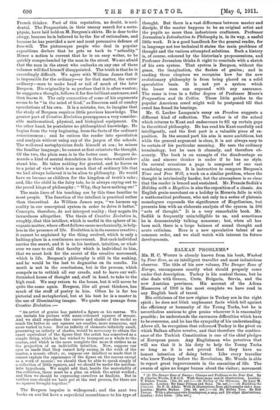BOOKS.
M. BERGSON AND OTHERS.*
WE now possess, in admirable English versions, M. Bergson's three chief works, and if some enterprising scholar will give us a translation of that wonderful monograph on the Comic, Le Rire, we shall have all his published volumes. Last sum- mer Mr. F. L. Pogson, whose tragic death in the Alps was a loss alike to philosophy and to literature, issued the earliest of the series, Time and Free Will, written while Bergson was still a lecturer at provincial lyeees. Of all his books we have always considered it the most perfect in form, for of late his originality, as William James says somewhere, has become profuse, and no reader can quite keep pace with the lightning evolutions of his mind. Matter and Memory was published just before he joined the staff of the Ecole Normale, while Creative Evolution, issued only four years ago, represents him at the zenith of his fame. All three books have been brilliantly translated. Perhaps Dr. Mitchell had the most difficult task, for in Creative Evolution profuseness is beginning to cloud the author's native lucidity. Miss Paul's version of Matter and .Memory seems to us the finest performance, for Bergson's French—as limpid as Plato's Greek—is rendered into English prose which is not far from its equivalent in grace and ease. Few philosophers have been artists in the presentation of ideas, but Bergson deals as scrupulously with an argument as a sculptor with his marble.
These translations are a proof, if proof were needed, of the extraordinary interest which is felt all over the world in the
• (1) Creative Evolution. By Henri Bergson. Authorised Translation by Arthur Mitchell. London : Macmillan and Co. [108. net.]—(2) Matter and Memory. Same author. Authorized Translation by Nancy Margaret Paul and W. Scott Palmer. London : Swan Sonnenschein and Co. 1108. 6d. net.]—(3) Introduction to Philosophy. By William Jerusalem. Translated by Charles F. Saunders. London : Macmillan and Co. 16s. 6d. net.j—(4) Pragmatism and its Critics. By Addison Webster Moore. Chicago : University Press. [5s. net.]—(5) On Freedom. By G. Locker Lampson. London : Smith, Elder and Co. res. net.1 —(6) A Holiday with a Ifogetian. By Francis Sedlik. London: A. C. Fillet& [°s. 6d. net,J
French thinker. Part of this reputation, no doubt, is acci- dental. The Pragmatists, in their uneasy search for a meta- physic, have laid hold on X. Bergson's skirts. He is dear to the clergy, because he is believed to be the foe of rationalism, and because he has provided a new and most persuasive defence of free-will The picturesque people who deal in popular expositions declare that he gets us back to " actuality." Hence a notion is current that he is an easy writer, to be quickly comprehended by the man in the street. We are afraid that the man in the street who embarks on any one of these volumes will find himself disappointed. The truth is that he is exceedingly difficult. We agree with William James that it is impossible for the ordinary—or for that matter, the extra- ordinary—man to make head or tail of much of the later Bergson. His originality is so profuse that it is often wanton; he suggests a thought, follows it for five brilliant sentences, and then leaves it. The only connection of some of his arguments seems to be "in the mind of God," as Emerson said of sundry speculations of his own. It is a mistake, too, to imagine that the study of Bergson requires little previous knowledge. The greater part of Creative Evolution presupposes a very consider- able mathematical, physical, and biological equipment. On the other hand, he postulates no philosophical knowledge. He begins from the very beginning, from the facts of the ordinary consciousness ; and he entices the reader into speculation and analysis without using any of the jargon of the schools. The well-read metaphysician finds himself at sea ; he misses the familiar language ; he cannot at first orientate the thought. Of the two, the plain man is in the better case. Bergson de- mands a kind of mental denudation in those who would under- stand him. He takes nothing for granted, and he forces us to a point of view which is so much that of ordinary life that we had always believed it to be alien to philosophy. He would have us become as children for the kingdom of truth's sake ; and, like the child in the fairy tale, he is always crying out to the proud kings of philosophy : " Why, they have nothing on!" The main lines of his teaching are by this time familiar to most people. The function of the intellect is practical rather than theoretical. As William James says, "we harness up reality in our conceptual system in order to drive it better."
Concepts, therefore, do not interpret reality ; they negate its inwardness altogether. The thesis of Creative Evolution is, roughly, that this intellect, which is useful in the sphere of in- organic matter, where effect follows cause mechanically, is help- less in the presence of life. Evolution is in its essence creative ; it cannot be explained by the thing evolved, which is only a baiting-place in a continuous movement. But each individual carries the secret, and it is in his instinct, intuition, or what- ever we care to call that faculty which is individual to him, that we must look for the secret of the creative movement, which is life. Bergson's philosophy is still in the making, and he would be the last to dogmatise on its results. Its merit is not in the conclusions, but in the process, which compels us to rethink all our creeds, and to leave our well- furnished house of thought and, staff in hand, to take to the high road. We may return to the house, but it will never be quite the same again. Bergson, like all great thinkers, has much of the stuff of poetry in him. Often he is far too pictorial and metaphorical, bat at his best he is a master in the tate of illuminating images. We quote one passage from Creative Evolution :—
" An artist of genius has painted a figure on his canvas. We can imitate his picture with many-coloured squares of mosaic. And we shall reproduce the curves and shades of the model so much the better as our squares are smaller, more numerous, and more varied in tone. But an infinity of elements infinitely small, presenting an infinity of shades, would be necessary to obtain the exact equivalent of the figure that the artist has conceived as a simple thing, which he has wished to transport as a whole to the canvas, and which is the more complete the more it strikes us as the projection of an indivisible intuition. Now, suppose our eyes so made that they cannot help seeing, in the work of the master, a mosaic effect; or, suppose our intellect so made that it cannot explain the appearance of the figure on the canvas except as a work of mosaic: we should then be able to speak simply of a collection of little squares, and we should be under the mechan- istic hypothesis. We might add that, beside the materiality of the collection, there must be a plan on which the artist worked, and then we should be expressing ourselves as finalists. But in neither case should we have got at the real process, for there are no squares brought together."
The Bergson impulse is widespread ; and the next two books on our list have a superficial resemblance to his type of thought. But there is a vast difference between master and disciple, if the master happens to be an original artist and the pupils no more than industrious craftsmen. Professor Jerusalem's Introduction to Philosophy is, in its way, a useful little work. It is a good handbook for the general reader, for in language not too technical it states the main problems of thought and the various attempted solutions. Such a history is, of course, coloured by the historian's prepossessions, and Professor Jerusalem thinks it right to conclude with a sketch of Ms own system. That system is Bergson, without the grace, the imagination, the flashes of genius ; and in reading these chapters we recognise how far the new evolutionary philosophy is from being placed on a solid speculative basis. It is not yet a system which the lesser man can expound with any assurance. The same is true in a fuller degree of Professor Moore's Pragmatism. and its Critics. These little guides to the popular American creed might well be postponed till that creed has found its bearings.
Mr. G. Locker Lampson's essay on Freedom suggests a different kind of reflection. The author is of the school which returns to Kant and endeavours to fill up certain gaps in the critical philosophy. He has read his Kant carefully and intelligently, and the first part is a valuable piece of ex- position. In the second part his aim is more ambitious, but while the general argument is clear, it is not always easy to be certain of his particular meaning. He uses the ordinary terminology, but he uses it clumsily, and therefore ob- scurely. The book is an example of the disadvantage an able and sincere thinker is under if he has no style. On several occasions a page is composed of one vast wandering sentence. It is instructive to compare Bergson's Time and Free Will, a work on a similar problem, where the thought is intrinsically harder, but the atmosphere is so clear that the reader is braced and sustained. Mr. Francis Sedlik's Holiday with a Hegelian is also the exposition of a classic. An English grain-merchant on a holiday in Moravia falls in with a mathematical professor, who not only in a series of platonic monologues expounds the significance of Hegelianism, but presents him with an elaborate analysis of the system in 596 " acts of thought." It is a very remarkable book. Mr. Sedlik is frequently unintelligible to us, and sometimes he is demonstrably talking nonsense ; but, when all has been said, there is a large balance of sound thought and acute criticism. Here is a new speculative talent of no common order, and we shall watch with interest its future developments.











































 Previous page
Previous page